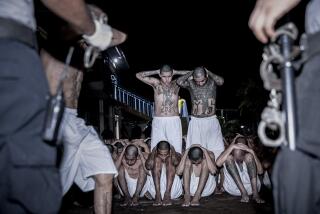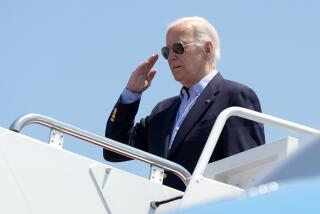S. Korea Firms Apologize for Slush Fund Aid
Confessing that they regularly made under-the-table payments to a series of presidents in the past, South Korea’s largest conglomerates apologized Friday and pledged to never again provide illicit political funds.
They also declared that President Kim Young Sam, who is known as a reformer, has halted the practice of businessmen contributing to slush funds that “became a custom . . . during our short history of modernization”--which began in 1961, when the first of three generals-turned-politicians ruled the country.
The confession and the pledge were made in a statement by the Korean Federation of Industries, the nation’s most influential business organization, made up of conglomerates that dominate South Korea’s economy. It came as prosecutors summoned two business magnates for questioning in connection with a $653-million slush fund that former President Roh Tae Woo has admitted to raising while in office.
Clearly intended to forestall investigations from sweeping across the business world, the statement was unprecedented in its admission of a culture of corruption.
“It is true that, during our short history of modernization, political culture was not firmly rooted, and establishing and donating dark political funds was a custom. We admit this was the seed of today’s undesirable incident,” the statement said.
“We businessmen feel very ashamed of our direct and indirect links to [Roh’s slush fund]. . . . We sincerely apologize to the people. . . . We will never provide under-the-table political funds on any occasion for any cause in the future,” it added.
The statement was approved by 23 key members of the federation who attended a special meeting called by Chey Jong Hyon, chairman of the federation who also heads the giant Sunkyong Group.
*
During the meeting, Chey, whose son is married to Roh’s daughter, delivered “a sincere apology for the undesirable connections of politicians and businessmen of the past.”
He also expressed concern that a prolonged investigation into Roh’s slush fund will hurt the economy, which this year is roaring ahead at a 9% real-growth rate. “The investigation into business corporations should be concluded as quickly as possible,” he said.
Attending the meeting were the chairmen of the Samsung, Hyundai, LG and Ssangyong conglomerates.
Kim Woo Choong, chairman of the Daewoo Group, the nation’s third-largest conglomerate, who is visiting Poland, was absent. Although prosecutors have not summoned Kim Woo Choong for questioning, they told Korean reporters that he is suspected of helping Roh hide a chunk of his leftover money.
Last year, the Daewoo chairman was convicted of, and given a suspended jail sentence for, bribing an executive of an electric power company to win a construction contract.
About 10 other business leaders who had been expected to attend failed to show up, including Chung Tae Soo, chairman of the Hanbo Group, whom prosecutors summoned Friday for questioning on suspicion of helping Roh hide $78 million in leftover slush funds. Hanbo soared from obscurity into the ranks of the top 20 conglomerates during Roh’s 1988-93 term in office.
One other businessman was also summoned, the prosecutor’s office said: Bai Jong Ryul, the retired chairman of the Hanyang Group.
The federation’s declaration that President Kim, true to a public promise he made shortly after taking office in February, 1993, had stopped accepting political contributions offered a small but welcome boost to the president.
Kim, who was an opposition leader until he joined Roh to form a new majority party in 1990, has insisted that he had nothing to do with Roh’s slush fund. But he has refused to disclose any details of the funds that Roh, as head of the ruling party, provided for Kim’s 1992 campaign as the party’s candidate for president.
An election law at that time limited spending for any single candidate to $39 million and required that funds pass through an Election Management Commission for checking.
On Friday, thousands of students staged sporadic protests throughout the country, demanding Roh’s arrest. About 5,000 students demonstrated on one Seoul campus, and thousands more staged protests in other cities.
Masses of riot police armed with tear gas, including gas-spraying tanks, filled much of the City Hall plaza in Seoul, but only minor disruptions in traffic were reported.
The street protests were the first since Roh made a tearful TV confession of the slush fund on Oct. 27.
*
Ahn Kang Min, one of the prosecutors in charge of the Roh investigation, revealed that his office had asked the Foreign Ministry to request that Switzerland search for accounts Roh may have opened there. While Roh was in office, his daughter, Roh So Yong, was convicted of illegally bringing $200,000 into the United States from a Swiss bank and was given a suspended sentence.
Last year, the Seoul district court exonerated her of any violation of Korean law, on grounds that the money had come from her husband’s allowance and from wedding gifts.
More to Read
Sign up for Essential California
The most important California stories and recommendations in your inbox every morning.
You may occasionally receive promotional content from the Los Angeles Times.






